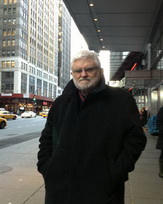
May 7, 2014
Chris McDonnell, UK
Come
and eat with me
(Comments welcome here)
chris@mcdonnell83.freeserve.co.uk

|
|
May 7, 2014 Chris McDonnell, UK Come
and eat with me (Comments welcome here) |
chris@mcdonnell83.freeserve.co.uk
|
Two
crucial post-Resurrection stories of Jesus are centred on the sharing of a meal,
supper after the journey to Emmaus and breakfast by the lake of Tiberias . The
offering of food, the sustaining of life, both are never far away from the
message of the Gospel. What the man from Galilee is offering his followers he
then demands they offer to others. His forgiveness of Peter comes with the
codicil that Peter has something to do, “Feed my
lambs, feed my sheep”. The Mission of the Church has begun.
In our natural lives, food and drink are there to sustain growth and good
health. So too the Eucharist and our experience of Prayer are there to sustain
our closeness to God.
We share a meal with friends in a sociable way, offering the hospitality of our
table and the warmth of our companionship. But then there are other occasions
when the need of food arises from real hunger, just as we are also aware of the
need to drink when thirst dries our mouth. Conviviality has become necessity.
So the Eucharist is there not only for the good times, when everything is fine
and we feel right with the world and with the Lord. No, it is there for the
times of struggle and pain, when things have gone wrong, when we have made
mistakes, when we need the sustenance that is offered to us. That is what makes
the current discussion in respect of Marriage, the event of its failure and
reception of the sacramental gift so urgent. The Eucharist is there as food for
the journey, not as a gift for being good, not as a prize for being
well-behaved.
In a similar way, our prayer is never a constant, self-satisfying experience.
Emptiness and darkness are sometimes the only apparent consequence of our effort
to pray. Words do not come and all we can do is just be there.
That morning, as the sun rose over the waters of the lake, there was uncertainty
among the fishermen as to who had kindled the fire for breakfast, yet deep down
they knew who it was.
From our morning, through to evening each day, from our birth to our passing, it
is Christ who sustains us.
Christ
of woods
of trees
and forest
Christ of leaves
of darkness
and damp
Christ of sunrise
of dawn
and mist morning
Christ of brightness
of noontime
and
warmth
Christ of evening
of sunset
and stillness
Christ of space
between solitude
and silence
Christ of emptiness
of clearing
beyond Other
Christ of inner peace
our Being
and end.
Source:
“Morning prayer” from the collection Pieces
of a Broken Jar - 1998
reflections
on Thomas Merton during the Hermitage years - Chris McDonnell
see
also:
“Giving” or “Sharing”
-
differing perspectives on the Eucharist:
The
Furrow
May, 2014-Tom O’Loughlin, Professor of Historical Christianity
in
the University of Nottingham , UK
END
--------